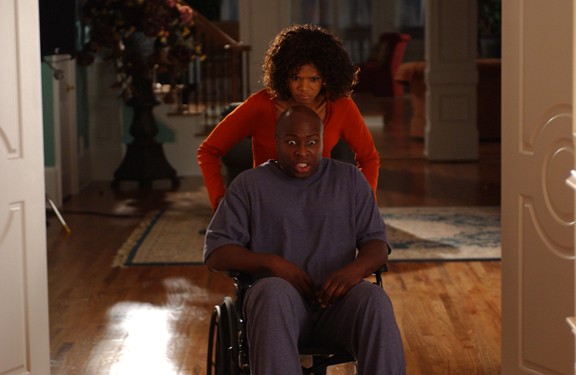
Kimberly Elise and Steve Harris play Helen and Charles, a disgruntled couple in Tyler Perry’s Diary of a Mad Black Woman, which opens this weekend.
If you’ve been on the Metro recently, you’ve seen the ads: a side view of a husky, older black woman, pointing a gun Dirty Harry-style toward the title Diary of a Mad Black Woman. You probably hugged your date’s arm and got a reply of “What the hell is that?” or “That doesn’t look like Hellboy.” Well, don’t go sleepless any longer — Diary of a Mad Black Woman arrives in theaters tomorrow. Lucky you.
Kimberly Elise (Beloved, The Manchurian Candidate) is the star of this madcap, borderline disturbing dramedy as housewife Helen. She’s been keeping a diary when we meet her on the eve of her 18th wedding anniversary (although she appears to be in her early 30s). She is oblivious to the fact that her husband, an attorney who is pretty much the piece’s villain, is cheating regularly.
When Helen begs for an anniversary bubble bath, he claims he’s going to the office to pick something up, which is movie speak for, “I’m totally cheating on you.” When he drives her home, she asks if there’s anything she can do to make the marriage better. He shoves the passenger door open and says, “You can get the hell out of the car.” So, maybe they weren’t 18 pleasant years (Diary of a Mad Blind Woman, maybe?).
Played by Minority Report’s Steve Harris, husband Charles was nasty enough to merit a few loud boos at the screening I attended.
Yeah, it’s that kind of movie.
It takes Charles’ entrance into his and Helen’s house with his girlfriend and their five-year-old for Helen to realize she was cheated on. Then, he doesn’t say, “We’re getting a divorce” or “I think you need to leave,” but physically throws her out the door. Lying outside her own home, Helen is shattered and homeless. (It’s a major disappointment when she isn’t suddenly attacked by dogs with bees in their mouths that shoot bees when they bark — or something.)
After kicking her fine-looking, cornrowed driver Orlando (Shemar Moore) out of the U-Haul truck, she finds a safe haven at her grandmother’s place. However, granny Madea (played by the film’s male writer, Tyler Perry) is a gun-toting, loudmouthed nutcase. She’s the film’s real standout character — no surprise considering she’s the one on the posters. Her first suggestion when told of Helen’s plight is a ridiculous, over-the-top siege of Charles’ house, which ends with grandma slicing up any clothes with “Dolce & Gabbana” on them. Silly old people!
From this point, Helen deals with single life. This involves trading barbs with Medea and her husband Joe (also Perry), working her very first job as a waitress and being romanced by the sexy Orlando, who represents the type of sweaty, flawless, hardworking gentleman these movies tend to have.
Diary is based on a play by Perry, one of five shows that feature the Madea character. The plays, which he presented off-Broadway, have grossed an impressive $75 million. Each play features him as Madea, yukking it up in faith-based stories about religion (he’s Catholic) and family. But the thing he seems to know is comedy: Madea is a riotous character at times, and her bombastic, insane unpredictability trumps other crossdressing performers such as Martin Lawrence, who crafted a similar character in the inane Big Momma’s House.
Still, the writing is obvious and the characters are mere sketches, which works in comedy but destroys any dramatic momentum the film seems to desire. Orlando is stoic and unrelenting in his somewhat pervy pursuit of recently single Helen and tells her he wants to make her life “a fairy tale.” Helen asks about her wayward, drug-abusing sister, “What happened to her?” and Madea solemnly replies, “Life.” Do we really need that? No.
Again, it’s that kind of movie.
Diary rests strongly on its Christian faith. While the themes aren’t too prevalent, Diary is a Christian movie, and that may not sit well with all audiences. Sure, people may laugh when Helen’s voiceover celebrates Orlando as being, among other positives, “Christian.”
Indeed, it’s fairly by the Book (you know which), while the story could go without religion — or the diary, which serves as an extremely obvious commentary device (i.e., “I don’t think Charles is being honest with me”). Yet the movie never really comes across as mad, crazy or moving, only unintentionally funny and really distracted. Still, nice cornrows.



